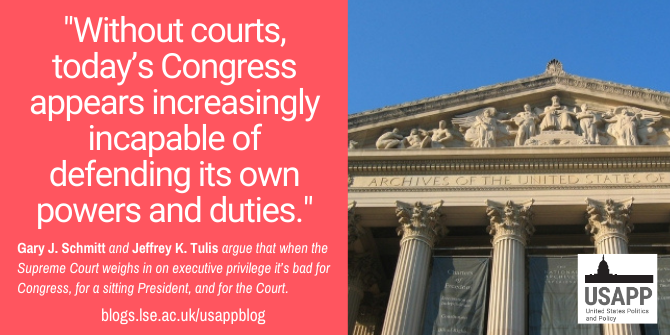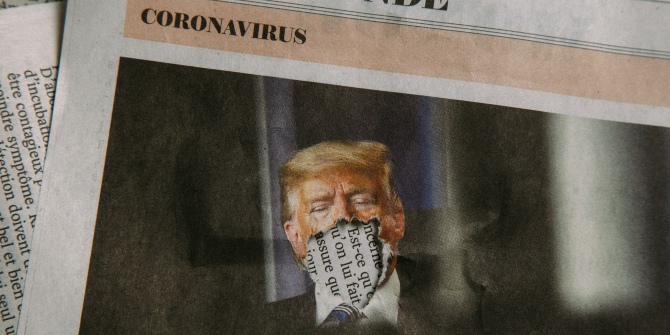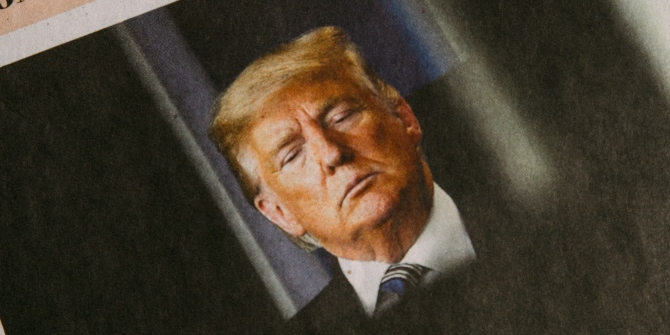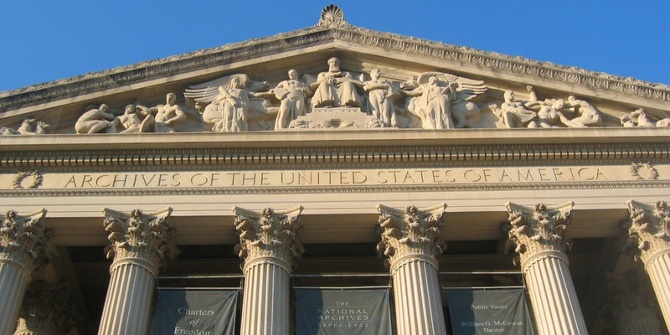
 The US Supreme Court has recently rejected former President Trump’s request to stop the National Archives from releasing White House records from during his tenure. Gary J. Schmitt and Jeffrey K. Tulis look at the recent history of disputes over executive privilege between Congress and the executive, and argue that while hyper-partisanship in the legislature has necessitated the Supreme Court’s involvement in resolving these disagreements, this is not good for Congress – or for the Court.
The US Supreme Court has recently rejected former President Trump’s request to stop the National Archives from releasing White House records from during his tenure. Gary J. Schmitt and Jeffrey K. Tulis look at the recent history of disputes over executive privilege between Congress and the executive, and argue that while hyper-partisanship in the legislature has necessitated the Supreme Court’s involvement in resolving these disagreements, this is not good for Congress – or for the Court.
On January 19, in Trump v. Thompson, the Supreme Court rejected a request by former president Donald Trump to prevent the National Archives from releasing White House records that the House January 6 Select Committee had requested for its investigation into that day’s events. The high court let stand a decision by the D.C. Circuit that the former president’s arguments for asserting executive privilege were insufficient when compared with the Congress’s need for the information to carry out constitutionally legitimate functions. Moreover, the Circuit Court gave particular weight to the fact that the incumbent President, Joe Biden, agreed with the committee that the materials should be handed over. As the lower court stated, “The profound interest in disclosure advanced by President Biden and the January 6th Committee far exceed [Trump’s] generalized concerns for Executive Branch confidentiality.”
In denying Trump’s application for a stay, however, the Supreme Court, in an unsigned order, pushed aside the lower court’s suggestion that it mattered that a sitting president had waived asserting executive privilege. Instead, because of the Circuit Court’s conclusion that “Trump’s claims would have failed even if he were the incumbent,” the Supreme Court declared that the “discussion…concerning President Trump’s status as a former President must therefore be regarded as nonbinding dicta.”
Former presidents, executive privilege, and the separation of powers
Not content with the unsigned order’s dismissal of the lower court’s argument about the significance of a sitting President’s decision, Justice Kavanaugh penned a two-page opinion that a former President has the right to assert executive privilege even in the face of an incumbent President’s contrary views. He cited US v. Nixon’s (1974) conclusion that a President “and those who assist him must be free to explore alternatives in the process of shaping policies and making decisions and to do so in a way many would be unwilling to express except privately.” The passage of time does not condition this restriction. Advisors want and expect confidentiality “in the present and future.” Absent the ability to claim executive privilege, a former President and his advisors may well be undressed for the public to see by a current or future president for partisan reasons.
Given Justice Kavanaugh’s long-standing concerns with separation of powers as a law professor, White House counsel and judge we should take his logic seriously. It’s also bolstered by case law. In Nixon v GSA (1977), the Supreme Court found that a former president can make a claim, noting that “the privilege survives the individual President’s tenure” because the “privilege Is not for the benefit of the President as an individual, but for the benefit of the Republic.”
But Kavanaugh’s argument has key weaknesses.
To begin, because the privilege might survive a president’s tenure in light of its benefit to the public good does not settle who may assert privilege or who may weigh its merit. The fact that an incumbent or future president might have a partisan reason for not siding with an ex-president on an executive privilege claim has no more constitutional relevance than an incumbent president asserting a claim to avoid disclosure of embarrassing material. Both may be true, and both may be true at the same time. But, as far as the Constitution is concerned, there is only one executive at a time and his authority is, as Article II’s opening line makes clear, the sole executive power. By the President’s oath, it is his responsibility to “faithfully execute the Office of President,” and, hence, it is his judgment that should be conclusive in determining what might be in the best interest of that office.
Moreover, it seems just as possible, if not likely, that a sitting President will avoid denying a former President’s claim of privilege on simply partisan grounds knowing that he will be a former president soon enough. A tit-for-tat exposure of presidential papers is in no President’s interest, a point noted by the Circuit Court in its opinion in Trump v. Thompson.
One need not deny that some partisan advantage might be part of that decision by a President; but rather, the sitting President’s longer-term self-interest and some sense of constitutional proprieties are likely to matter as well.
Partisanship, political ambition and The Constitution
It is worth dwelling for a moment on why holding office is vital to the resolution of separation of powers disputes.
Justices sometimes invoke the political questions doctrine with respect to executive privilege and observe that most disputes are worked out between the branches in the “hurly burly” of political bargaining. This is sometimes thought to be rooted in the “checks and balances” of the Constitution as famously depicted in Federalist, Number 51. However, “hurly burly” does not adequately capture the logic of separation of powers contestations.
The famous insight that “ambition will be made to counteract ambition” in The Federalist is nested in a theory connecting ambition to the “constitutional rights of the place.” If the Constitution works according to design, office holders are motivated to find reasons for their decisions and policies that might be persuasive to other office holders and to attentive citizens. Interest motivates a search for public-regarding reason. The same dynamic is supposed to occur in Congress where it may have demanded information prompted by partisan considerations but justifies those demands with public regarding reasons.
Each institution’s officers translate their partisan positions and political ambitions into constitutional reasons that take on a life of their own – to the extent that the officers feel compelled to respond to each other on the plane of constitutional argumentation. This kind of hypocrisy – in which the reasons are a cover for lower interests and ambitions—is a virtue of institutional design even though we would regard it as a defect of personal character in private life. If the separation of powers design works, the act of political translation induces the office holders to inhabit a space in which they think about and stand up for the institutional perspective of the presidency and Congress and they do that, in part, by responding to good arguments by the opposing institution.
The essential point here is that former office holders are no longer tethered to their institution. They hold no office. Their only interest is in advancing their personal interests or ambitions. Of course, in doing so, former office holders might initially generate good public-regarding arguments just as office holders do. But what motivation do they have to concern themselves with the merit of arguments of Congress, or the actual long-term needs of the presidency? Out of office they no longer inhabit the institutional space from which it makes sense to translate private ambition to an institutional point of view. They are no longer “connected with the constitutional rights of the place.”
Diminished executive privilege, presidential record-keeping, and the role of the Courts
Returning to Kavanaugh’s invocation of the Court’s statement in Nixon v. GSA that “the privilege survives the individual President’s tenure” because the “privilege Is not for the benefit of the President as an individual, but for the benefit of the Republic,” we note that this statement is lifted by the Court from the Solicitor General’s brief against Nixon on behalf of the sitting president and his administration. A sitting President is not only an individual, more importantly he is an officer. A former President is no longer an officer and is only an individual. The privilege survives but the weight that should be accorded a former President’s invocation is weak compared to that of sitting office holders, as the Court concluded in Nixon v. GSA. Former Presidents are more likely to invoke the privilege for the benefit of themselves as individuals and not “for the benefit of the Republic” as the Trump case illustrates.
Complicating matters is the history of presidential record-keeping and the relatively recent statute governing presidential records, both of which are at odds with the constitutional design.
Up until Nixon, a president took his papers with him as personal property. They never should have been regarded as his personal property. That problematic practice has been fixed. Now, the government, through the National Archives, holds them. Under the law, when a former President wants to claim executive privilege over material, the Archivist must “consult” with the sitting president “to determine whether” he or she “will uphold the claim asserted by the former President.” This is a sensible provision that assists a sitting president in the exercise of his or her institutional duties.

“U.S. National Archives” (CC BY-NC-SA 2.0) by afagen
However, If the incumbent President decides not to back the past President’s claim, the Archivist “shall release” the record “unless otherwise directed by a court order in an action initiated by the former President.” In other words, the presumption of who upholds or denies the claim by a former President in the first instance sits with the current President but, ultimately, resides with the courts.
Calling on the courts to adjudicate presidential claims of executive privilege is, in terms of constitutional history, relatively new. Indeed, it wasn’t until US v Nixon that the Supreme Court recognized a constitutional basis for executive privilege, even while rejecting the specific claim because of the competing and overriding interest in “the fair administration of justice.” In other words, the Court here was overturning a privilege claim as it looked to its own area of responsibilities. Today, however, this narrower balancing test has ballooned into the courts putting their thumbs on the scales for whichever competing claim they find most deserving between a Congress’s need for information and a President’s requirement for confidentiality.
This is both surprising, and not surprising at all.
It’s surprising because as Chief Justice Roberts recognized in his majority opinion in Trump v Mazars (2020) that having the Supreme Court adjudicate between Congress’s attempt to get Trump’s financial records and his attempt to block that effort by claiming privilege was a “significant departure from historical practice.” From the earliest days until the present, Congress and the White House had resolved their theoretical tug-of-war over executive privilege by “the give-and-take of the political process.” Accordingly, Roberts writes, the Court must be careful not to disrupt this time-tested practice (though as we argue, Roberts has only a partial and somewhat misleading understanding of the time-tested practice and the theory that lies behind it).
Chief Justice Roberts’ four criteria for congressional subpoenas for Trump’s records
But it’s not surprising that the Court had to weigh in since the congressional subpoenas for Trump’s and his children’s financial records from banks and his accounting firm, Mazars, were challenged in court by Trump in his personal capacity, arguing that the subpoenas “lacked a legitimate legislative purpose.” The lower courts had found that the congressional committees seeking the materials did serve “a valid legislative purpose.” But Roberts and the concurring justices sent the matter back to the lower court, stating that neither the committees nor Trump had adequately made the case for their positions and, in particular, the committees had “fail[ed] to take adequate account of the significant separation of powers issues raised by congressional subpoenas for the President’s information.” Instead, Roberts told the courts to judge the matter along four criteria that he set out: 1) the courts should consider whether “other sources could reasonably provide Congress the information it needs;” 2) subpoenas should be “no broader than reasonably necessary to support Congress’s legislative objective;” 3) the courts “should be attentive” to the reasoning put forward by Congress “to establish that a subpoena advances a valid legislative purpose;” and 4) the courts “should assess the burdens imposed on the President by a subpoena” with an eye on the “use” of the subpoenas “for institutional advantage.” Although not strictly speaking a dispute over a claim of executive privilege, it seems likely that Robert’s criteria in some fashion or another will be employed by the Court when addressing a dispute over subpoenas involving claims of executive privilege less obviously resolvable than what the Court faced in Trump v. Thompson.
No doubt because the issue before the Court in Mazars was over a congressional subpoena, the Chief Justice’s criteria for assessing the legitimacy of the request leans heavily toward placing the burden on Congress or a committee to make the case for its request. Putting aside that the fact that, constitutionally, Congress’s need for information to conduct oversight is no less legitimate than the President’s assertion of executive privilege, what is striking is that the Court has given itself the task of assessing which branch has the better case. On their face, one can concede that the criteria seem reasonable enough but also that, as Justice Thomas noted in dissent, the “four-factor test” is of “uncertain origin.” Stripped of judicial niceties, the courts will be making nothing more than a practical assessment about the worthiness of each branch’s claims untethered from reading any particular law.
The Constitution’s framers would have been surprised by this result since they expected the two political branches to be the judges of their respective institutional privileges. But the best theory of the “political questions” doctrine presupposes a Congress in which a strong majority of its members stick up for the institution more than party. If a committee wants documents, Congress needs to stand behind it – so that the fight is between the presidency and the legislature, not between partisans within Congress.
Congress needs to rediscover the power of inherent contempt
Similarly, Congress needs its own enforcement mechanisms. Today, possible prosecution of individuals who ignore congressional subpoenas is up to the Justice Department and, despite statutory language stating that a U.S. attorney has a “duty” to bring criminal contempt charges to a grand jury, the Department has “read” the law as not overriding the Executive’s “discretion…to determine whether a violation of the law has occurred.” Indeed, since 2008, the House of Representatives has passed criminal contempt charges against four executive branch officials (Harriet Miers, Josh Bolton, Eric Holder, and Lois Lerner) for failing to provide a committee information and materials, and, in each case, the Department has punted on bringing any of them to a grand jury. Seemingly forgotten is that Congress has the power of inherent contempt, with which it has previously tried and convicted reluctant witnesses, or credibly threatened to try and convict them, and held them in custody until they were willing to comply. This process is not designed as a criminal proceeding and is analogous to a judge holding a witness in contempt of court until they were willing to comply with the Court’s direction.
Nor has Congress decided that it would use its role in budget-making to enforce its subpoenas. In sum, without these two things – institutional loyalty and its own institutional tools for compelling compliance – oversight and accountability will in critical instances default to assistance from the courts.
The Supreme Court is ill-suited to police the boundaries between executive and legislative power
The Supreme Court’s decision to let the D.C. Circuit Court’s decision in Trump v. Thompson stand, green lighting the Archives to turn over a cache of Trump White House records to the Select Committee, is seen by virtually everyone as the correct policy outcome given the unprecedented events of January 6. Undoubtedly, it will also have an impact on former Trump aides and advisors who have until recently declined to cooperate with the committee based on less-than-specific claims of presidential privilege of confidentiality. This is all to the good in getting to the bottom of the former President’s possible role in that day’s riot.
However, this outcome also reveals a paradox regarding separation of powers today. On the one hand, Court arbitration of separation of powers disputes comes to the aid of a legislature that is now dysfunctional due to the hyper-partisanship that prevails over institutional loyalty and constitutional fidelity. On the other hand, the Court is ill suited to the task of policing the boundaries between executive and legislative power. The issues at the boundary of institutional power reflect the political priorities of the nation and it is not the Court’s job to determine them.
Because of the structure of the American executive– its unity at the top—Presidents who hold office consistently stand up for the office. In Congress, by contrast, hyper-partisanship has denuded a culture that had once made collective action in defense of institutional prerogatives possible. In this present-day circumstance, judicial arbitration is necessary to bolster the institutional interests of the legislature. Without courts, today’s Congress appears increasingly incapable of defending its own powers and duties.
Over the longer term, however, judicial arbitration of separation of powers disputes is bad for Congress and it is bad for the Court. It is bad for Congress because it further erodes and undermines Congress’s own tools and its own incentives to defend itself. It is bad for the Court because the decisions it renders go beyond the legal determination of the existence of constitutionally authorized power to the balancing of the inherently political claims of coordinate branches of the government. If nothing else, the Court’s exercise of this power reinforces the view among citizens and elites alike that it has become the kind of political institution that the Justices claim it not to be.
- A version of this article first appeared at The Constitutionalist.
Please read our comments policy before commenting
Note: This article gives the views of the author, and not the position of USAPP– American Politics and Policy, nor of the London School of Economics.
Shortened URL for this post: https://bit.ly/3B8G3hK
About the authors
 Gary J. Schmitt – American Enterprise Institute
Gary J. Schmitt – American Enterprise Institute
Gary J. Schmitt is a senior fellow in Social, Cultural, and Constitutional Studies at the American Enterprise Institute.
 Jeffrey K. Tulis – The University of Texas at Austin
Jeffrey K. Tulis – The University of Texas at Austin
Jeffrey K. Tulis is Professor of Government and Professor of Law at The University of Texas at Austin.






